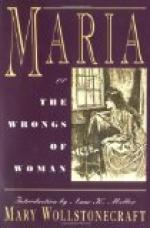“Shortly after the change I have mentioned in my husband’s conduct, my uncle was compelled by his declining health, to seek the succour of a milder climate, and embark for Lisbon. He left his will in the hands of a friend, an eminent solicitor; he had previously questioned me relative to my situation and state of mind, and declared very freely, that he could place no reliance on the stability of my husband’s professions. He had been deceived in the unfolding of his character; he now thought it fixed in a train of actions that would inevitably lead to ruin and disgrace.
“The evening before his departure, which we spent alone together, he folded me to his heart, uttering the endearing appellation of ’child.’—My more than father! why was I not permitted to perform the last duties of one, and smooth the pillow of death? He seemed by his manner to be convinced that he should never see me more; yet requested me, most earnestly, to come to him, should I be obliged to leave my husband. He had before expressed his sorrow at hearing of my pregnancy, having determined to prevail on me to accompany him, till I informed him of that circumstance. He expressed himself unfeignedly sorry that any new tie should bind me to a man whom he thought so incapable of estimating my value; such was the kind language of affection.
“I must repeat his own words; they made an indelible impression on my mind:
“’The marriage state is certainly that in which women, generally speaking, can be most useful; but I am far from thinking that a woman, once married, ought to consider the engagement as indissoluble (especially if there be no children to reward her for sacrificing her feelings) in case her husband merits neither her love, nor esteem. Esteem will often supply the place of love; and prevent a woman from being wretched, though it may not make her happy. The magnitude of a sacrifice ought always to bear some proportion to the utility in view; and for a woman to live with a man, for whom she can cherish neither affection nor esteem, or even be of any use to him, excepting in the light of a house-keeper, is an abjectness of condition, the enduring of which no concurrence of circumstances can ever make a duty in the sight of God or just men. If indeed she submits to it merely to be maintained in idleness, she has no right to complain bitterly of her fate; or to act, as a person of independent character might, as if she had a title to disregard general rules.
“But the misfortune is, that many women only submit in appearance, and forfeit their own respect to secure their reputation in the world. The situation of a woman separated from her husband, is undoubtedly very different from that of a man who has left his wife. He, with lordly dignity, has shaken of a clog; and the allowing her food and raiment, is thought sufficient to secure his reputation from taint. And, should she have been inconsiderate, he will be celebrated for his generosity and forbearance. Such is the respect paid to the master-key of property! A woman, on the contrary, resigning what is termed her natural protector (though he never was so, but in name) is despised and shunned, for asserting the independence of mind distinctive of a rational being, and spurning at slavery.’




